
A Better Alternative to Using a UK Company List
Simone Autiero, 03 November 2023
If you’re researching businesses located in Britain, a UK company list isn’t a bad place to start. These lists—which often come as downloadable Excel files or PDFs—will give you some background info: company names, industries, founders, and perhaps annual revenue.
But there are downsides. Not only is it time-consuming to sift through thousands of listings, but the information won’t be as complete or accurate as you need. And it’ll be difficult to set your outreach priorities or make important decisions based on static, out-of-date, data.
The main disadvantages of conventional company lists include:
- Only including publicly-traded companies, meaning you just get information on the UK’s biggest businesses. That might be useful if you want data about the likes of AstraZeneca, GSK, and BAE Systems. But if you’re interested in the UK’s fastest-growing companies or local/regional success stories, you’ll be disappointed.
- Only having the most basic, simple data, meaning you miss out on the really interesting stuff—things like employee count growth, operating locations, products and patents, and partnerships. Company lists won’t have this kind of intelligence.
- Sourcing all their information from Companies House, the government’s free business registry. The data you find here is typically limited to information on legal entities and it’s not always current. Plus, Companies House says it “does not verify accuracy of information filed”—so it’s not always accurate.
Conventional company lists, therefore, only get you so far. You may get a rough picture of the UK business landscape, but that’s not enough to help you make commercial decisions. For example, if you’re a university looking for local partnerships, you’ll need far more robust information about what a business does; its industry, products, people, and patents.
The same standard applies if you’re an investor. You need to find companies using very precise criteria, for example startups with a certain value, in a certain area, with a certain type of product. The UK company lists you find on the web don’t tend to provide that information.
In this post, we’re going to introduce an alternative to the conventional UK company list. Beauhurst’s platforms give you deep, up-to-date, and accurate information on every private UK company. We’ll explain how our index beats any downloadable list, and show three examples of the kinds of companies you can find using one of Beauhurst’s platforms.
Five reasons Beauhurst’s database beats any UK company list
With Beauhurst, you can access UK company data through four data platforms that we’ve designed for four different types of organisations:
- BeauhurstImpact, for universities and the public sector
- BeauhurstInvest, for investors
- BeauhurstAdvise, for professional and financial services teams
- BeauhurstSales, for sales teams
Each platform has full access to our complete set of UK company data. This means you can easily find the companies you want to invest in, or partner with—and get a big-picture view of any regional business ecosystem.
1. Access and compare up-to-date information on all UK companies
Beauhurst provides you with the deepest data available on every private UK company.
In total, we have information on about 13m companies, both active and inactive. And that number is growing all the time. That’s not just publicly-listed companies, nor only the largest businesses—but local SMEs, new startups, and fast-growing UK brands.
We compile our data from a range of authoritative sources before cleaning it up, enriching it, and structuring it so it’s easy to search, navigate, and compare. Plus, we have a team of 60+ data analysts—supported by machine learning technology—who verify all the information, identify anomalies, and make sure everything is completely up-to-date.
In short, Beauhurst’s data is data you can trust. And it’s far more detailed data than you’d get from any conventional company list.
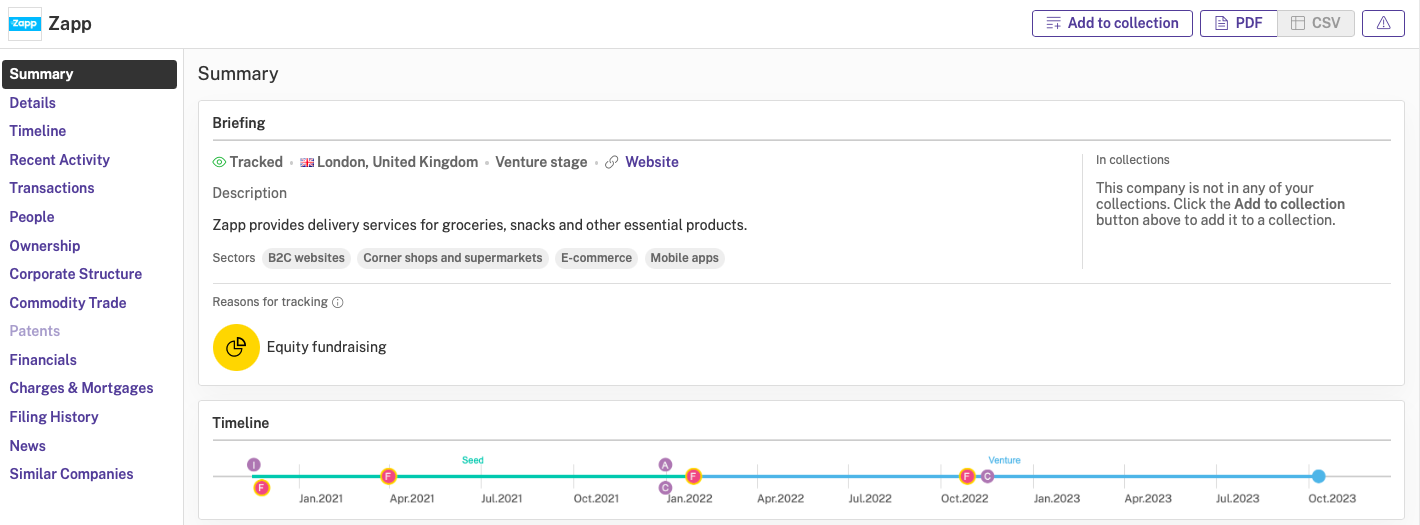
You can see the depth of Beauhurst’s data by visiting any company page in our database.
Here, you’ll have access to rigorous information about a given company, including:
- Key company events. For example, whether they have spun out of a university, received funding, or been in the media.
- Operating headquarters and location. Lists based on legal entity data will only tell you where businesses are legally registered, not where they actually operate.
- Financial data. You can dig into a company’s financial performance, including turnover, operating profits, and funding raised.
- Influential people, including executives, investors, and the gender balance of the workforce.
- Patents, including the technology registered, and whether it’s registered in Europe.
- And much more.
For example, you can check out how a company has grown over time, what levels of fundraising it has received, and people who’ve worked there that are in your network.
Plus, you can use the business’s profile to find similar companies, too. Beauhurst identifies these using sophisticated machine learning algorithms to match key company information with other businesses with similar traits. You’ll be served a list of similar companies, to make it easier to find opportunities that exactly meet your unique needs.
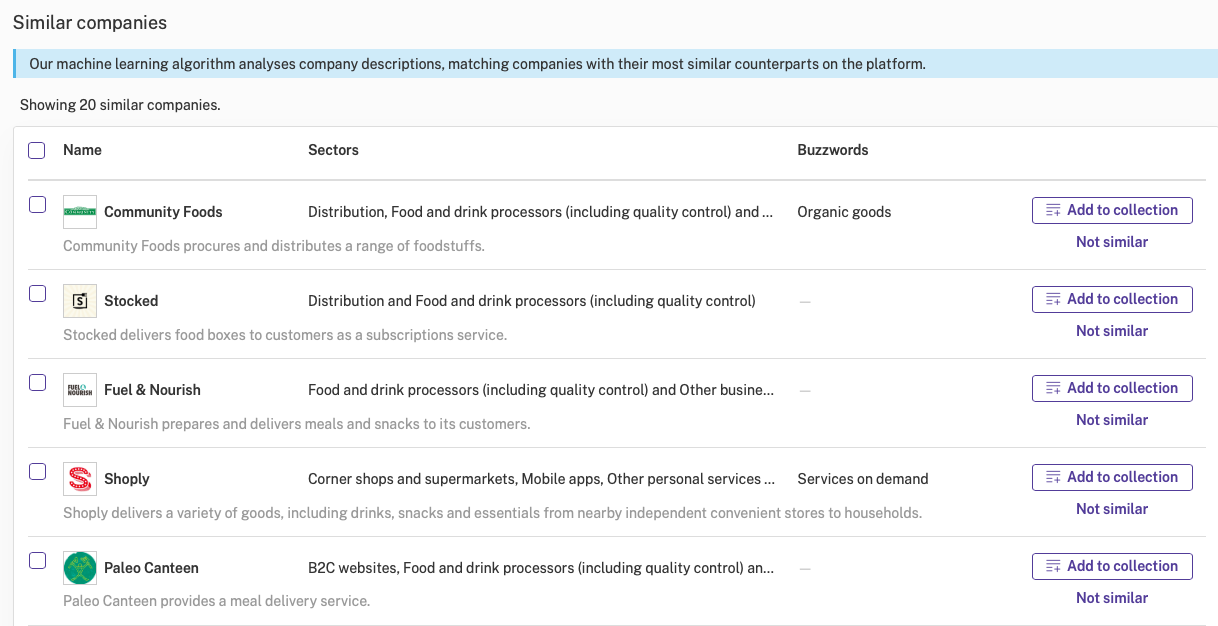
For instance, the recruiter, Bailey Fisher, uses Beauhurst data to understand who works at a company, to make sure they’re engaging with the right individuals in that company. Then, they can compare that information with other organisations.
“Once we’ve worked with a company, we go back to their page on Beauhurst and, depending on how niche the company is, we can get a list of roughly 20 similar companies to reach out to”, says Toby Young. “Beauhurst is the leading platform in the UK […] It’s just been a very easy tool to use and a great asset to our business. Beauhurst is just much quicker, more accurate and intuitive than other tools we’ve tried.”
2. Get a list of companies that match your precise needs
If your organisation is seeking businesses to engage or partner with, you’ll have precise criteria in mind. Rather than buying a catch-all general list of British companies, it’s far more beneficial to create that list yourself, based on information that’s actually relevant to you.
With Beauhurst’s platforms, that’s easy. You can simply search for the companies that match your precise requirements, based on many overlapping search criteria.
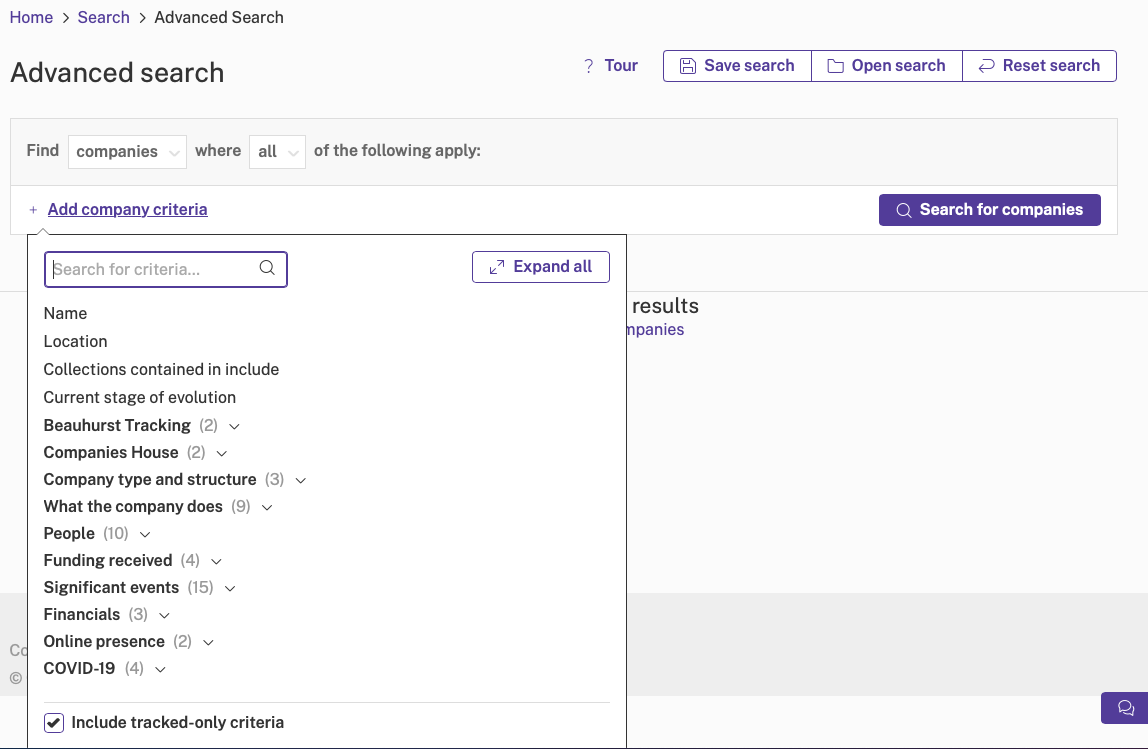
You can create a custom business list by searching for any of the following criteria:
- What the company does. By clicking the “What the company does” dropdown, you can search businesses by SIC codes, commodity trade activity, target market, and buzzwords. For instance, you can search for companies in “fintech” or “blockchain”.
- Location. Search by registered address, trading address, or head office.
- Current stage of evolution. You can refine your list to startups, companies at the venture stage, or established brands.
- Significant events. Limit your search to university spinouts, companies that have filed European patents, or publicly traded companies.
- Financials. You can refine and order your search results by turnover, pretax profits, or another financial metric.
You can also overlap all these criteria for more focused results. For example, if you want to see foodtech startups in London that have received funding, that’s easy. You’ll immediately receive a list of companies that meet those requirements:
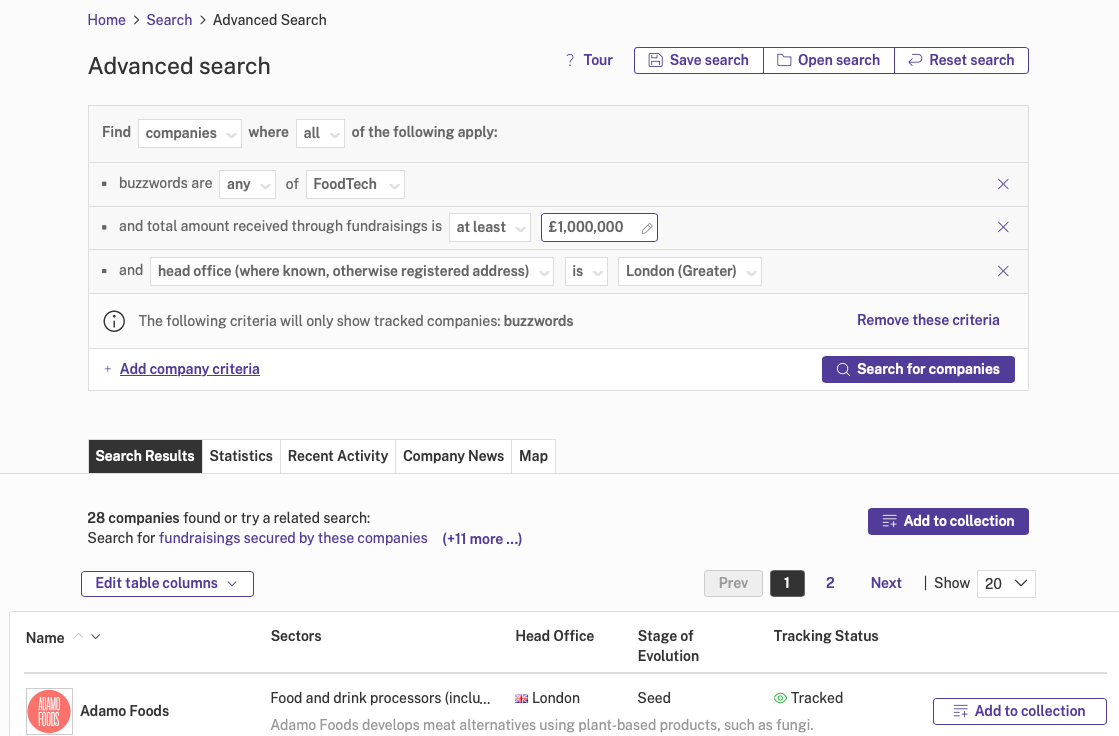
This is exactly how the Lancashire County Council uses Beauhurst; to identify scaling businesses in the county. The Council’s Business Finance and Scaleup team uses Beauhurst to find and track companies of the right size, location, and profile.
“I spend a lot of time looking at equity investment rates within Lancashire and using the platform’s Advanced Search tool to identify businesses that are raising equity,” says Amin Vepari, Business Finance and Scaleup Lead. “I can see the kind of investment they’ve secured so far, what stage in their development they’re at, and really drill down into the specifics, like borough, sector, size of business, and so on.
“With Beauhurst, we have access to real-time information, with a level of detail that we wouldn’t get anywhere else. And we can use this information to reach out to new businesses.”
3. Track trends in a particular region
You can also use Beauhurst’s database to see an overview of what’s happening in your local area. As well as searching for a specific company, you can look at regions to get headline data on trends, employment figures, local data, and lists of businesses relevant to that area.
For example, search for Glasgow and you’ll be served a complete list of businesses operating there—which you can arrange by size, industry, funds raised, and much more.
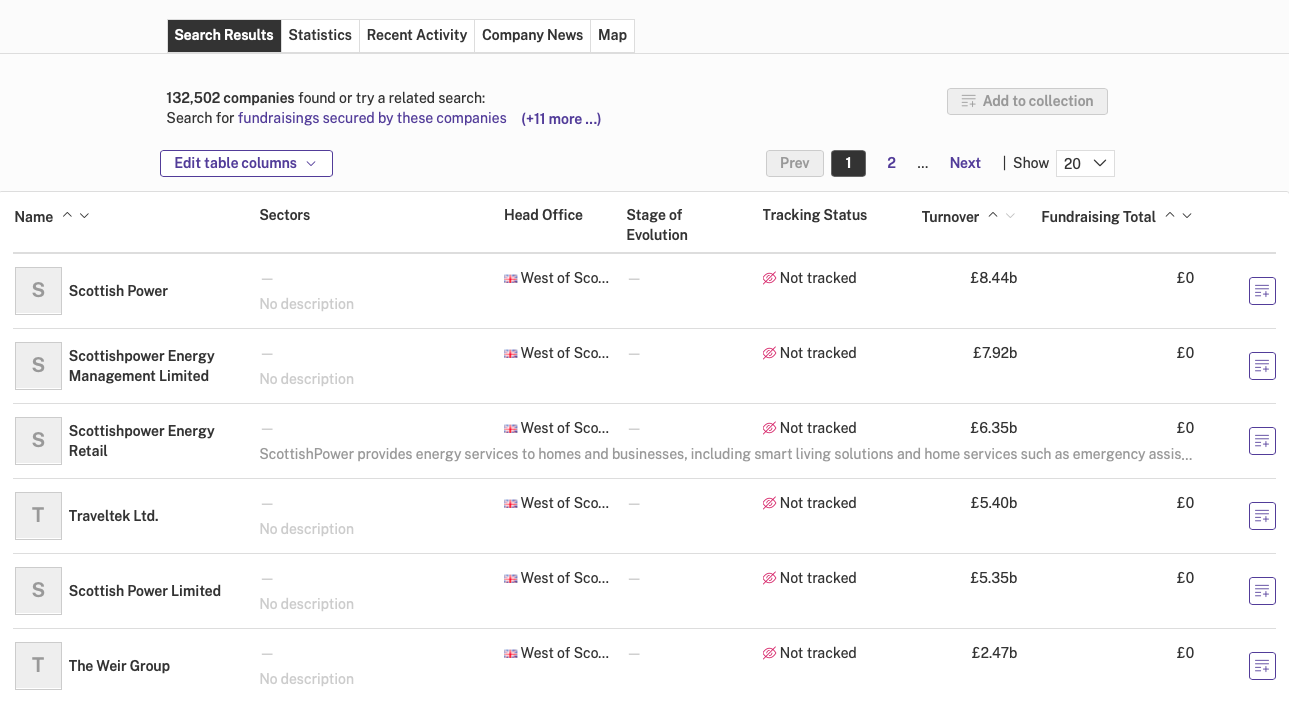
By using one of Beauhurst’s platforms, you won’t need to trawl through a list of irrelevant businesses to find the information you need. Simply enter the criteria and you’ll be immediately shown all relevant data. Your dashboard will also show you a range of other information about businesses in a given region, including:
- The number of active businesses over time
- Businesses broken down by sector and SIC code
- Companies by stage of evolution
- The gender balance of executives and company workforces
- And a lot more
For example, you can see the largest companies in the area, by turnover or funding raised.
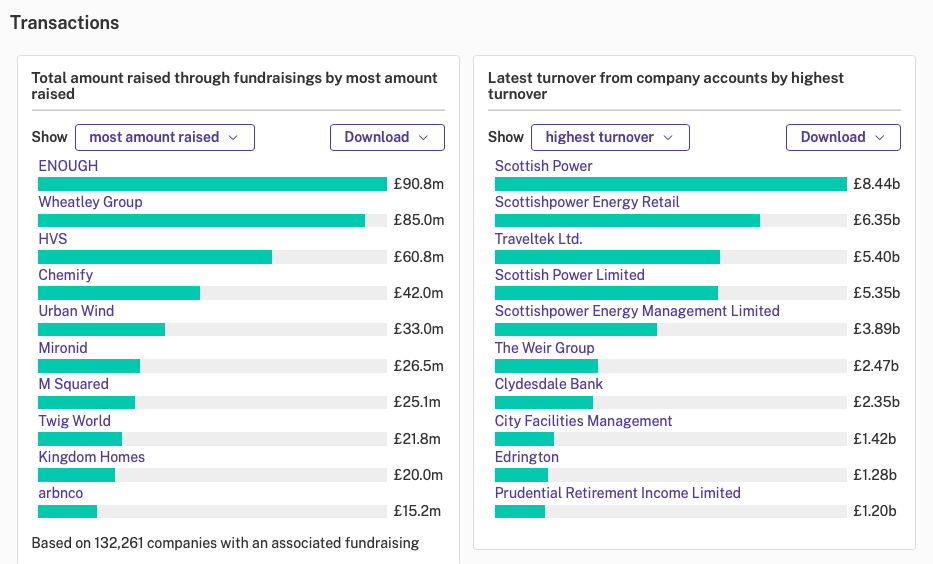
This data is much more tailored than you’d find anywhere else. For instance, you can break the information down even further so you only see companies that have received funding, or companies who have a woman director. If you’re a university, local authority, or business, it’s an invaluable tool to give you insight into what’s happening in your area.
As an example, the Coventry & Warwickshire Growth Hub has been using Beauhurst to track local organisations and find out whether a business may be relevant to them.
“The granularity of data on the Beauhurst platform is also quite astounding—whether it’s how many university spinouts are operating in our area, which companies have received Innovate UK grants, or a news article from six months ago about a company raising funds,” says Jon Bass, Finance Specialist at the Growth Hub. “I would say Beauhurst is a must-have. We may need to hire an extra team member if we didn’t have access to the platform.”
4. Be the first to know about any new relevant companies or changes to the data
Whatever business data you’re looking for, that real-world information will constantly be changing. New businesses will join a local market, companies will receive funding or cease business, and personnel will change.
With a static company list, you won’t have visibility over what’s evolving in the companies and industries that are relevant to you. As a result, you’ll be making important decisions based on out-of-date or inaccurate information.
On the other hand, with Beauhurst’s platforms, it’s easy to stay completely up-to-date with the companies you’re interested in. Simply, make a search and click “Add to collection”. Now, this information will be saved into the “My Collections” tab and you’ll receive notifications whenever new data comes in that’s relevant to your search.
You can choose what information you receive and how often you receive it. Just select the events you want to be notified about.
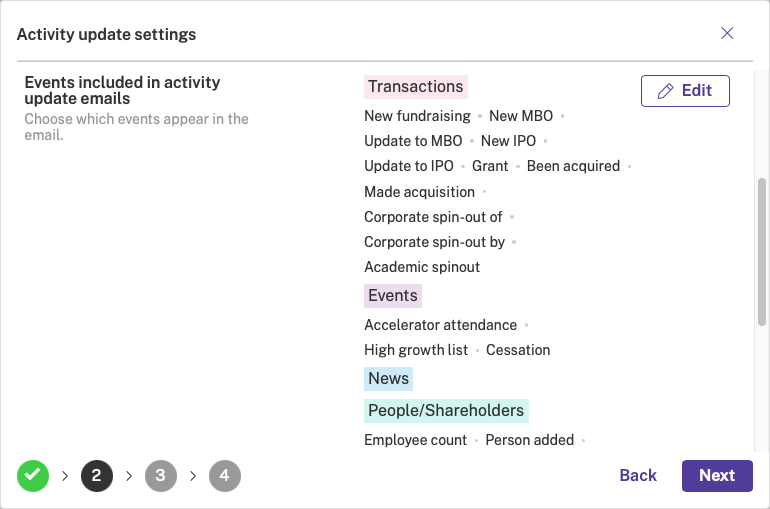
This means you never miss out on any changes in your target business environment.
You can see when a company spins out of a university, or when a business’s credit score is updated, and much more—as soon as it happens. For instance, the Science and Technology Facilities Council (STFC) uses Beauhurst’s Collections to stay in the loop with startups that have previously worked in the STFC’s incubation programmes.
Specifically, to measure the success of these programmes, the STFC tracks the number and amount of investments that the companies have later raised.
“I have our 70+ alumni companies organised in a Collection, and can easily see a live chart of all the fundraisings they’ve secured in their lifetime,” says Operations Manager, Sue O’Hare. “I can quickly check whether any of the companies have completed a deal or have hit the news. I use these events as a trigger to reach out to them and get an update.”
5. Get information on key individuals
Beauhurst has more information than you’d find on any simple UK company list.
And you won’t just find data about organisations or entities, but insightful information about who works at those companies, too. In fact, we have information on more than 20m influential individuals in the UK business ecosystem. Organisations use this information to find local experts in their area, invite people to events, or to find high-quality clients.
Just like the company search, you can search for individuals by a wide range of criteria:
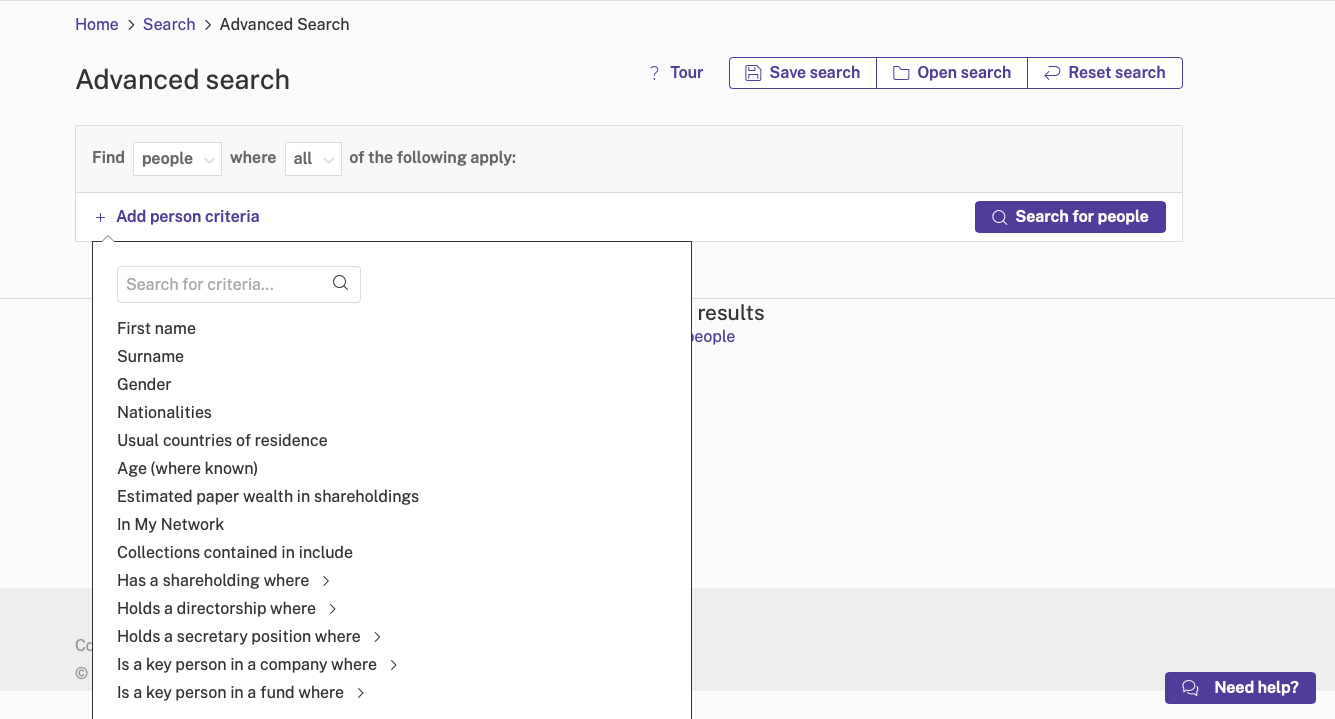
For example, you can search for individuals who are active in a particular local industry, people who hold shares in a particular company, or people who have a similar position elsewhere. You can also refine the list to include only those in your network, by first or second degree. Then, you can discover many data points about them, such as their past and present job roles, the shares they own, and their contact details.

As an example, Home Grown is a private member’s club that uses Beauhurst to find members who fit their customer profile.
“In a nutshell, Beauhurst has been an invaluable tool for enabling us to identify new members that will find Home Grown useful, and allows us to be really specific with our targeting,” says Jessica Barwell, Marketing Communications Manager. “But it also helps on a couple of other fronts, making it super easy to stay up to date with our members. And [it’s] a fantastic source of industry news and insights which we like to share with our networks.”
Three examples: Creating your own up-to-date lists with Beauhurst
Throughout this guide, you’ve seen examples of how businesses can access company information through Beauhurst’s database. Whether you’re interested in healthcare companies in England, telecommunications brands in Scotland or Wales, or aerospace firms in Manchester, you don’t have to rely on messy, unfiltered lists exported from business registries—you can create these lists yourself based on the criteria you want to include.
To finish, here are three examples:
1. 20 largest companies in the UK by turnover
2. 20 venture and growth companies by total funds raised
3. 20 top UK growth companies that have spun out of a university, by total funds raised
Remember, this isn’t even the tip of the iceberg. Not only can you generate lists of whatever kinds of UK company you want (e.g. fintech startups in the UK with more than 20 employees), but you can dig into each specific company profile to learn more about them.
Get UK company data at your fingertips with Beauhurst
If you want to make critical decisions based on real-world data, you’ll need more than a simple UK company list. With Beauhurst, you can access up-to-date information from across the UK’s business landscape based on the specific criteria you need. Plus, with Beauhurst, you’ll get your own dedicated account manager to help you leverage the data in smart ways.
Book a demo with us to see how Beauhurst can work for your organisation.
Grow your business.
Get access to unrivalled data on all the companies you need to know about, so you can approach the right leads, at the right time.
Book a demo today to see all of the key features of our platforms, as well as the depth and breadth of data available.
An associate will work with you to build a sophisticated search, returning a dynamic list of organisations that match your ideal customer profile.
Beauhurst Privacy Policy